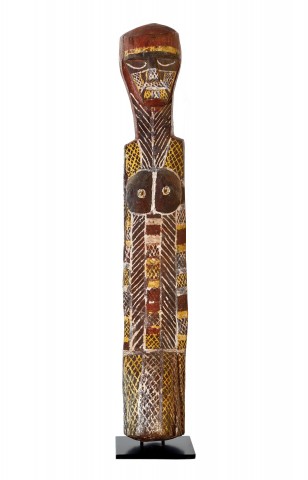DOUBLE SIDED JANUS FIGURE OF BIMA/WAI-EE, c.1964
MICK ARUNI ILLORTAMINNI
natural earth pigments on carved hardwood
73.0 cm height
Most likely created at Paru on the south-western edge of Melville Island, Northern Territory, in the early to mid-1960s
Aboriginal Arts and Crafts, Sydney
Private collection, Melbourne, acquired from the above in 1977
Thence by descent
Private collection, Melbourne
Accompanied by a nondescript handwritten and faded label that reads: "BIMA or WAI-EE/ TIWI CARVING BY ….MICK/ARUNI/... …PRESENT 1977/...CRAFTS PTY LTD”
together with a copy of a certificate from Aboriginal Arts and Crafts Pty Ltd. which states: ‘It is thought that the Tiwi of Bathurst and Melville Islands were introduced to carving human figures by Malay Trepang fisherman from the Celebes, who made seasonal visits to northern Australian waters, fishing for Trepang, over a period of several centuries. The carved and elaborately decorated figures became an integral part of Tiwi ceremony and are used to represent tribal ancestors from the Dreamtime. The isolation of the Tiwi people from the mainland also contributed to the development of a unique art style which differed distinctly from that of mainland aboriginals.
This female figure represents Bima or Wai-ee, the unfaithful wide of Purukapali, who in the Dreamtime decreed that all Tiwi should die after discovering the death of his son and his wife’s unfaithfulness. Because of her remorse, Bima then turned into the Curlew who roams the forest at night wailing in remorse for her mistakes and for the child she tragically lost.’
